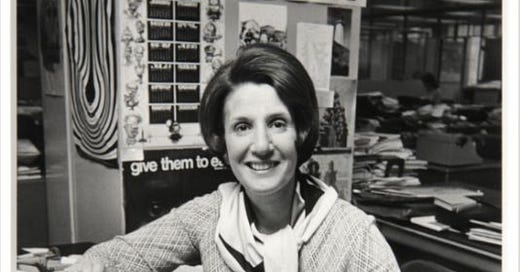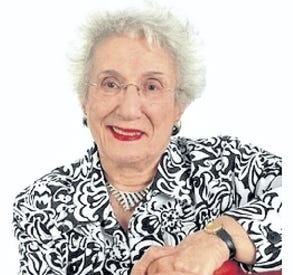Eulogy for Dusty Vineberg Solomon
I’m sharing some private grief publicly in order to honor a great lady
One of the best parts of my ill-fated first marriage—second only to giving life to the most amazing daughter on the planet—was having the luck to know my now ex-husband’s stepmother. Sadly, she passed away on September 23, 2023, at the fine old age of 96.
Augusta (“Dusty”) Meyers Vineberg Solomon, born in 1926, grew up in Montreal, Quebec, in a family of Viennese Jews who had immigrated first to the United Kingdom and later to Canada. She and her sister, Trina, grew up in a large house in Westmount—a wealthy anglophone enclave in Montreal—next door to their cousin, Leonard Cohen, who later took a more creative path in life (as a poet and singer-songwriter) than either of these conventional women would do, although both sisters were trailblazers in their own right.
Dusty and my ex-husband’s father, Samuel Solomon, dated in college, when they both attended McGill University. But Dusty’s mother, Eva Friedman Vineberg (who lived to 100 and who I never called anything but “Mrs. Vineberg”), and her father, Herbert Asher Vineberg (a member of the Royal Flying Corps and later the Royal Air Force during World War I), strongly disapproved of the relationship.
Sam, you see, was the son of a shoemaker, a refugee from Poland who simply wasn’t of the Vineberg’s class. Moreover, Sam’s mother, Rachel, was known to suffer from some kind of unnamed mental illness (possibly bipolar disorder or schizophrenia), which Dusty’s parents feared would be hereditary. So when Sam proposed, Dusty turned him down. This was not a match her parents could approve, and she wouldn’t go against their wishes.
Dusty was ambitious in any case, and wanted to be a journalist. So after graduating from McGill with a Bachelor’s degree in English in 1948, she moved to New York and got a Master’s degree at the Columbia University School of Journalism, one of only a handful of women in her class. Then she moved back to Montreal and proceeded to build a brilliant career. She was one of the first women to join the newsroom of the English-language Montreal Star, and became a leading features writer and, later, one of the first TV columnists in Canada. She was also an editor at DecorMag, and at Tundra Books with her friend May Cutler. Dusty won many awards and is remembered as one of the pioneering women in journalism in Canada.
In fact, Dusty was the Enid Nemy of Montreal (and of course she knew Nemy). Anybody who was anybody and came through Montreal was interviewed by Dusty Vineberg. During her twenty-two-year career at The Star, Dusty interviewed and became friends with leading figures of the day, including writer Robertson Davies, poet Irving Layton, scientist Lee Salk, architect Moshe Safdie and actor Geneviève Bujold, among many others. Whenever I would discover a Canadian writer or artist or public figure that I found interesting, Dusty would invariably have a funny or heart-warming personal story to tell me about them.
Dusty was cultured, well-read, a marvelous conversationalist, funny, warm, and I can only imagine she must have conducted brilliant interviews.
At some point in the 1970s, after Sam and his first wife, Sheila, divorced, Sam and Dusty got together again. By then, Dusty had long since accepted that she would never have biological children of her own. But she and Sam married, and she became a loving stepmother to Sam’s three sons—especially David, who didn’t get along with his mother’s new husband, and who as a young teen moved out of his mother’s large house and into Sam and Dusty’s small two-bedroom apartment.
David’s father was very strict, and insisted that David come straight home from school every afternoon. No extracurricular activities for this boy. After all, he had to study hard so that he could go to medical school someday! But Dusty, who had given up her career as a journalist (in her 50s) to become—belatedly—a traditional housewife and mother, was a good companion to David. Dusty was an accomplished cook, and during afternoons David spent with her after school, she taught him what she knew. He became quite a good cook himself as a result.
When David came down with Guillain-Barré syndrome after a family trip to the Caribbean, he became paralyzed from the neck down, and spent months in the hospital recovering. Dusty visited him every day, reading him stories, chatting with him, or just sitting and doing embroidery by his bedside while keeping him company. The delicate embroidery-edged linen napkins she finished during that time later became known in the family as the Guillain-Barré napkins.
The first time I met Dusty, she came to pick David and me up in the morning at the train station in Montreal. We had taken the overnight train from Manhattan. She was wearing a mink coat and large diamonds and was driving a brand-new Cadillac. (No Mercedes or BMW for this family; they wouldn’t drive a German car.) Their apartment, though small, was richly decorated, furnished with beautiful Persian carpets, silk-upholstered couches and expensive art. There were glass-fronted mahogany display cases filled with crystal and silver and small framed family photographs. She showed me an embossed, sterling silver visiting card holder that she said her mother had with her when she sailed across the Atlantic in 1914 on the same ship as Kaiser Wilhelm II, with whom she danced at a gala ball. The ship was meant to sail from London to New York, but turned back halfway across the ocean when the assassination of Archduke Franz Ferdinand set off what would become World War I, and the Kaiser had to quickly return to Europe.
I came from a modest middle-class family with no pretensions to grandeur. I had learned what fork to use during stints studying abroad in Europe. But I was still intimidated by the lavish spread Dusty served us for breakfast. And after saying yes to a second cup of coffee, I mistakenly put a little silver spoonful of salt in my coffee, thinking it was sugar. After one sip of that now vile brew, I quietly put it aside. It was then that I noticed another small silver bowl with filigreed silver tongs and squares of artisanal sugar, but it was too late. Luckily, nobody seemed to notice my faux pas.
As it turns out, I fell utterly in love with Dusty when we saw her again the next day. (We were staying with David’s mother and stepfather in their much larger home.) The first thing she said to me was, “Careen! Why didn’t you tell me you had accidentally put salt in your coffee at breakfast yesterday?!? I would have given you a fresh cup!” Embarrassed, I asked her how she knew I’d put salt in my coffee. “Well, I wondered why you didn’t drink it—since after all you’d said you wanted a second cup—so I tasted it,” she said with a laugh. “And it was horrible! Positively undrinkable!” This fine lady, with her furs and jewels and illustrious family ... she’d picked up my coffee and drunk it! That is when I realized that despite the displays of wealth and evidence of high culture, Dusty was down-to-earth and unpretentious, and as warm and understanding as a person can be. We were fast friends from that day forward.
My subsequent marriage to David broke down several years later for reasons I won’t get into here. To her credit, Dusty had an inkling early on that our future marriage might not be made in heaven, and she was the only one who tried to warn me. But I was blinded by love and couldn’t accept what she was saying. It speaks volumes about her character that she would try, even while she loved David like a son.
I am so glad David and I gave our daughter “Vineberg” as a middle name. The former Rachel Vineberg Shannon-Solomon has dropped both Shannon and Solomon in favor of taking her husband’s surname, Jones. But she has retained Vineberg and is now Rachel Vineberg Jones. Dusty’s sister, Trina Vineberg Berenson, also never had children. So although not related by blood, Rachel is helping this line of the Vineberg name to live on, at least for one more generation.
The world has lost a great lady (and “lady” is not a word I typically use, but it’s appropriate here). But Dusty Vineberg Solomon lived a long, full and illustrious life, and she was deeply loved by many. May her memory be a blessing.







Very touching obituary. It was great to hear all about Dusty at once as I had heard bits and lived over the years. I had not know that Leonard Cohen was her cousin! Sending you my condolences. It was a life well lived!